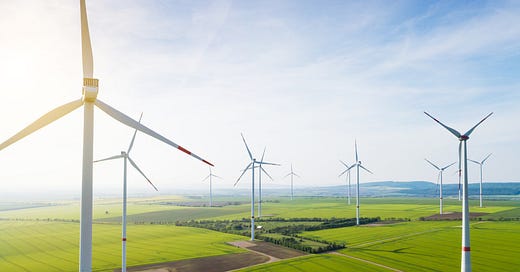I’m introducing a new genre to my newsletter. I’m going to keep writing pieces of peripatetic theory, random nerdiness, or timidly tangential memoir, but every now and then I’ll write up an argument to go around, a concise explanation of a single argument or perspective related to ongoing debates in social movements or society at large. Anyone who subscribes to my newsletter is likely to already be familiar with and even agree with the argument I present, but the piece will be designed for easy sharing, just in case anyone out there is having these conversations with family, friends, coworkers, or neighbors, and is looking for a little bit of help.
Many of these will draw on work I’ve already published in one of my books, and I’ll try to include a list of further reading and other resources. These days, plenty of people expect you to refute fairly noxious ideas in a single tweet. Getting someone to read a book is next to impossible when they’re not feeling particularly inspired to question their entire worldview, but hopefully these newsletters won’t be too long.
As always, I’d love any feedback. Send any additional resources you think are helpful my way (from books and articles to documentaries and Youtube videos, or even plays, cartoons, songs…) and let me know if sharing one of these helped open up a new direction in a conversation you’ve been having.
And now without further ado:
Why Green Energy Won’t Help Stop Climate Change
Why is green energy a sham? Let’s start with what we know.
*Climate change is real. Weather patterns around the planet are being violently disrupted and average temperatures are rising at a dangerous rate.
*The trigger for this change is the drastic increase in greenhouse gases in the atmosphere.
*The increase is being caused by energy production, by deforestation, by industrial pollution, and by current agricultural practices.
Therefore, we need to produce increasing amounts of green energy, energy from renewable sources like wind, solar, and hydro in order to remove one of the major sources of greenhouse gases.
If that conclusion sounded logical to you, you’ve just been had.
Confused? Go back to the premises and see if you can figure out how the argument for green energy is actually a non sequitur, a bait and switch.
The problem is actually deceptively simple. It is logical to believe that decreasing the burning of fossil fuels is an appropriate response to climate change. But they are pulling one over on us when they promote green energy, because in doing so they assume that more green energy means less fossil fuel energy. That assumption is basically saying that total energy production is like a pie. Right now, one slice of the pie (11%) comes from green energy, and nine slices come from non-renewables, mostly fossil fuels. Increasing green energy’s portion to five slices, for example, would reduce the burning of fossil fuels by four whole slices of pie, which would be great for slowing down climate change.
What is the fundamental feature of this vision of energy production? The pie doesn’t grow.
What is the fundamental feature of the capitalist economy that currently dominates the planet? It is based on growth, and in fact if there is no growth, the system collapses.
People who study the climate and institutions that promote green energy are aware of this fundamental feature of capitalism, and yet they continue to sell us what is essentially a flat earth economics. Why?
There are a number of reasons for this, but first I want to make sure we all understand what a failure green energy has been, even as it becomes more and more widespread.
Currently, the global economy uses 580 million terajoules of energy every year. In 1950, that figure was only 90 million terajoules. (To get some idea, a million tons of oil produces 41,868 terajoules of energy). So, energy production is growing at a significant rate, doubling every few decades, and unless capitalism collapses or is abolished, energy production will continue to grow.
But now that governments, businesses, and NGOs around the world are making an unprecedented push for renewable energies, surely green energy will be able to grow fast enough to catch up, right?
Wrong. Green energy makes up a minority of new energy production. In 2018, it made up only 1/3 the total increase in energy production. In other words, green energy is not replacing any of the energy from fossil fuels and it isn’t even stopping the growth of fossil fuels. While green energy grows, fossil fuels grow even more.
A basic understanding of capitalism should have made this outcome predictable, which means we are all being lied to. A slightly more complex understanding paints an even dirtier picture.
How are fossil fuels produced? Through an immense amount of infrastructure that includes surveying and drilling operations, mines and oil wells, refineries and pipelines, and all the education and tools needed by the professionals who keep the whole thing running. All that infrastructure represents hundreds of billions, if not trillions, of dollars in fixed capital. It’s fixed capital because it cannot easily be converted into another form of capital. An oil refinery cannot be deposited into a bank account. A coal mine cannot just start producing another commodity besides coal. These are investments that corporations have made for the sole purpose of making money. The only way they can make money instead of losing it is to keep using all this infrastructure.
So what happens when a competing source of energy arrives on the scene, the political winds shift, and that competing source receives support and subsidies so that it has a chance of producing cheaper electricity? Do the capitalists with major investments in fossil fuel infrastructure just call it quits, congratulate their competitors, and head home?
No. They lower the prices in order to stay competitive, in order not to lose all the fixed capital represented by their fossil fuel infrastructures. And the best way to keep making money when their profit margins have shrunk (because they’ve lowered the price) is to sell more of it. In other words, because of the basic rules of a capitalist economy, the most likely outcome of industrial-scale green energy is an increase in the production of fossil fuel energy. That is what any informed person would have predicted fifty years ago when certain scientists and entrepreneurs really began pushing for green energy. And that is exactly what has happened. Which has been great for the energy industry, much of which has mixed profiles anyway, with their fingers in the pots of green energy and fossil fuel energy alike.
But the full truth is even worse. Not only has green energy increased the burning of fossil fuels, wind energy, solar energy, biomass, and hydro power—when produced at an industrial scale—are all extremely damaging to humans and the environment. They require the massive theft of land (usually the land of Indigenous people and poor people), the destruction of rivers and forests, and they are the motor for what may turn out to be the largest mining boom in human history, with the attendant amount of deadly water and air pollution, clear cutting, destruction of the soil, and land theft.
Green energy has been successful at only one thing: making more money for capitalists, even as it wreaks immense damage to the planet.
Why do people promote it? Many scientists and the people who trust them promote it because they believe they can understand a problem created by one specific form of human social organization by only studying the physical aspects of that problem, and not paying any attention at all to the systems that produced the problem. In other words, they know a whole lot about climate systems, but they know nothing at all about industrial capitalism or human history, so they are groping around in the dark.
Many more scientists promote green energy because the majority of scientists are mercenaries. They listen to money.
Government planners promote it because state power rests on a monopoly of planning. A state is not a state if it cannot decide how society is organized. Unequal access to organizational power in a society always goes hand in hand with unequal access to economic resources. This means you cannot have rich and poor without governors and governed, and vice versa. In a complex society, not everyone who is rich will be a part of the government. In order to carry out their planning function, those with the political power need to make sure they are not at odds with those who have the economic power, whether by following them, controlling them, or some balance of the two. Whatever the case, government planners cannot act in a way that alienates them from the economic powers, and they certainly cannot abolish inequality, because their power to abolish or to regulate or to legalize rests on that very inequality.
What this means is that when the government faces a problem like the climate crisis, even if this is a problem that might kill us all, whatever solution they come up with has to satisfy a fundamental criterion: that it be good for the economy. Even if it is the economy that is killing us all. And that is why we have false solutions like green energy.
The fact that green energy is a total sham is an excellent illustration of how those who may pose the greatest threat to the ecosystem are not those who still deny climate change, it’s those who take it seriously but use a manipulative framing that favors certain economic and political interests while distracting from the real nature of the problem. But that’s a topic for another time.
There’s another loose thread I want to tie down. Criticizing green energy does not mean resigning ourselves to fossil fuels. A very different kind of renewable energy, utilizing the sun or the wind or biofuels but in a way that is designed for local, small scale production in an economy based not on growth but on meeting human and ecological needs, would actually be an important feature of an honest response to climate change. But that solution would be antithetical to government, antithetical to capitalism, antithetical to strip mining and land theft and all the other facets of colonialism.
Those are our choices. Something radically different, or more of the same.
Recommended reading and listening
Final Straw Radio, “A True(r) Measure of Renewable Energy”
Protect Thacker Pass, “Are Electric Cars a Solution?”
Ryan Devereaux, “Biden Moves Forward with Mining Project That Would Obliterate a Sacred Apache Religious Site”
Peter Gelderloos, The Solutions Are Already Here
Andrea Brock and Alexander Dunlap, “Normalising corporate counterinsurgency: Engineering consent, managing resistance, and greening destruction around the Hambach coal mine and beyond”
Alexander Dunlap and Martín Correa Arce, “Murderous Energy in Oaxaca, Mexico: wind factories, territorial struggle and social warfare”
And for a longer read that looks at how all states have been ecocidal, Worshiping Power






One reader just suggested this book as recommended reading, Richard Heinberg on peak oil and the impossibility of renewables replacing fossil fuels at current levels. https://richardheinberg.com/bookshelf/partys-over
As someone myself that works in the chemicals industry, this is all too familiar. What is as scary, is the myopic focus on ‘bio-alternatives’ for products as insanely named as ‘sustainable aviation fuel,’ never a more odd oxymoron and the lack of willingness by those with power to have pragmatic conversations around the mass misdirection underway. Appreciating your writing and grateful to Heather Luna for sharing your susbtack.